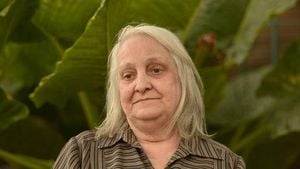Na In Woo, the South Korean actor known for his roles in popular dramas, has found himself at the center of controversy over his military service classification. Recently, complaints were filed with the Military Manpower Administration (MMA) calling for clarification on his 4th grade supplementary conscript status and subsequent military exemption. These concerns, stemming from the public's scrutiny of Na's fitness and the criteria for such classifications, have sparked intense discussion.
The complaints, lodged on October 19, 2023, questioned why Na, who at nearly 190 cm tall exhibits excellent health and vision, has been classified as suitable for only supplementary military service. One of the complainants noted, “Na's health seems to be excellent, as he even participated in sea swimming on entertainment shows, raising questions about his classification.” This individual, among others, argues it is unusual for someone classified as supplementary conscript to endure such lengthy waiting periods without being called for service.
Na received the 4th grade classification after completing his military service assessment, which traditionally qualifies individuals for social service roles instead of active military duty. According to the MMA's criteria, to achieve this classification, one must meet stringent conditions, often related to health issues, educational background, or familial military connections. The details surrounding Na's exemption instead raise eyebrows; he graduated from Dankook University without any legal issues and has maintained a healthy public image through various entertainment programs.
Many citizens express skepticism, stating things such as, “We request clear clarification from the Military Manpower Administration on the reasons for Na's supplementary conscript status.” They highlight the perception of unfair advantages granted to celebrities and the potential for double standards within the military draft process. An individual stressed, “It is unusual for a supplementary conscript to wait this long without induction,” indicating this situation deviates from the established norm.
The public discourse surrounding Na’s situation has been intensified by his active involvement in the entertainment industry during the three years spent awaiting conscription orders. Throughout this waiting period, Na has participated in the production of eight dramas and variety shows, keeping him visible and vibrant within the public eye. This raises the question of how he could juggle such intense commitments and yet remain categorized as unfit for military induction.
Adding to the intrigue is the public's demand for transparency. The MMA has yet to respond to specific inquiries about why Na's classification was granted, especially considering the criteria one must meet to receive such status. Given Na's impressive physical statistics, many feel underrepresented at the apparent lack of scrutiny directed toward his situation.
Critics argue this perceived preferential treatment can undermine social trust, prompting some to declare, “Na's case highlights systemic issues we face because of fame.” Such sentiments capture the demand for fair treatment within South Korea's military service obligations, emphasizing the right of every citizen to be held to same standards, regardless of their socioeconomic status or public recognition.
The confusion extends to how Na, if classified as unfit for military service, could undergo rigorous training and exposure on screen, demonstrating his physical capabilities. This paradox only fuels speculation about possible loopholes celebrities might exploit to avoid military service requirements. Na is now being viewed under the public microscope, representing the wider societal dilemmas of accountability faced by figures occupying elite positions.
Na’s agency, Hanada Company, only corroborated claims about Na receiving his military exemption after the three-year requisition period passed without notification for compulsory attendance. While they maintain the decision was made following legislative guidelines, specific reasons behind his initial classification remain shrouded in mystery.
Looking at the broader picture, Na’s exemption echoes the murmurs of discontent surrounding military service exemptions granted to other public figures, raising discussions about disproportionate standards enforced on celebrities. This situation echoes the sentiments surrounding fairness and transparency within military service policies, testing the public’s patience and trust.
Na’s story has left many asking if his case will incite necessary reforms for greater clarity and fairness within military service protocols, especially for those standing within the glamorous sphere of entertainment. The outcome of these complaints, and any potential revelations from the MMA, could shift perceptions, providing categorical assurance to both the public and individuals like Na seeking to navigate their responsibilities as citizens.
For now, the public awaits the MMA’s response, hoping for clarity on what has become not just about Na, but the principles of equity and transparency for every South Korean citizen obligated to serve.



